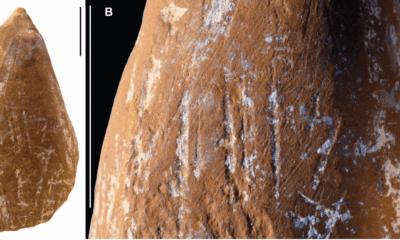Science
Study Reveals Kissing May Date Back 21 Million Years

A recent study indicates that kissing may have originated as far back as 21 million years ago, stemming from common ancestors of modern apes and early humans, including Neanderthals. This research, led by Matilda Brindle, an evolutionary biologist at Oxford University, explores the evolutionary significance of this widespread behavior, raising intriguing questions about its role in human and animal interactions.
The earliest recorded instances of kissing in human history appear in ancient civilizations, notably in Mesopotamia and Ancient Egypt, around 4,500 years ago. Despite this historical context, Brindle describes kissing as an “evolutionary conundrum.” She notes that while kissing carries potential health risks, such as disease transmission, it does not seem to provide any clear reproductive or survival advantages.
Brindle, who specializes in sexual behavior among primates, explained, “Kissing is one of these things that we were just really interested in understanding. It’s pervasive across animals, which gives you a hint that it might be an evolved trait.”
Methodology and Findings
The research team defined kissing as non-aggressive, mouth-to-mouth contact that does not involve food. Since this behavior is not preserved in the fossil record, the researchers employed a novel approach. They analyzed existing scientific literature to determine which modern primate species engage in kissing, identifying chimpanzees, bonobos, orangutans, and a species of gorilla as examples.
Using a phylogenetic analysis, the team inferred behaviors in extinct species based on the data collected from living animals. This involved constructing a genetic tree to ascertain relationships among various primate species. “With that information, we can kind of travel back through time,” Brindle stated.
To enhance the robustness of their findings, the model simulated various evolutionary scenarios, running 10 million iterations. The results, published in the journal Evolution and Human Behavior, suggest that kissing is an ancient trait among large apes. The study estimates that this behavior likely evolved in a common ancestor of the great apes between 21.5 million and 16.9 million years ago. Consequently, it is plausible that even extinct human relatives, including Neanderthals, engaged in kissing. Furthermore, given that modern humans, or Homo sapiens, interbred with Neanderthals, the possibility exists that these two species kissed each other.
Brindle emphasized that while the model indicates when kissing might have evolved, it does not explain the reasons behind this behavior. She noted several potential uses for kissing, such as mate assessment, bonding, and social interaction, but acknowledged the limited data available on kissing practices among non-ape species. Much of the information was derived from animals in captivity or sanctuaries, suggesting a need for further research.
The Cultural Context of Kissing
Despite the strong evolutionary evidence for kissing, it is not a universal behavior across human cultures. According to a 2015 study, kissing is documented in only 46% of cultures worldwide. Brindle explained, “We did find a strong evolutionary signal in kissing, but it doesn’t mean it has to be retained.” She suggested that for certain populations, kissing may not be beneficial, given its associated risks.
Dr. Adriano Reis e Lameira, an evolutionary psychologist and primatologist at the University of Warwick, who was not involved in the study, added that the majority of human kisses do not involve direct mouth-to-mouth contact. This indicates that the ways in which humans express affection are diverse and complex, further complicating the understanding of the evolutionary aspects of kissing.
In conclusion, this research marks a significant first step in unraveling the evolutionary origins of kissing. While it establishes the behavior as an ancient trait, the motivations and contexts for kissing remain areas ripe for future exploration. As Brindle noted, “It’s really ancient. But why? And that’s the amazing next step if people want to pick up the mantle.”
-

 Politics2 weeks ago
Politics2 weeks agoSecwepemc First Nation Seeks Aboriginal Title Over Kamloops Area
-

 World4 months ago
World4 months agoScientists Unearth Ancient Antarctic Ice to Unlock Climate Secrets
-

 Entertainment4 months ago
Entertainment4 months agoTrump and McCormick to Announce $70 Billion Energy Investments
-

 Lifestyle4 months ago
Lifestyle4 months agoTransLink Launches Food Truck Program to Boost Revenue in Vancouver
-

 Science4 months ago
Science4 months agoFour Astronauts Return to Earth After International Space Station Mission
-

 Technology3 months ago
Technology3 months agoApple Notes Enhances Functionality with Markdown Support in macOS 26
-

 Top Stories1 month ago
Top Stories1 month agoUrgent Update: Fatal Crash on Highway 99 Claims Life of Pitt Meadows Man
-

 Sports4 months ago
Sports4 months agoSearch Underway for Missing Hunter Amid Hokkaido Bear Emergency
-

 Politics3 months ago
Politics3 months agoUkrainian Tennis Star Elina Svitolina Faces Death Threats Online
-

 Politics4 months ago
Politics4 months agoCarney Engages First Nations Leaders at Development Law Summit
-

 Technology4 months ago
Technology4 months agoFrosthaven Launches Early Access on July 31, 2025
-

 Lifestyle2 months ago
Lifestyle2 months agoManitoba’s Burger Champion Shines Again Amid Dining Innovations











